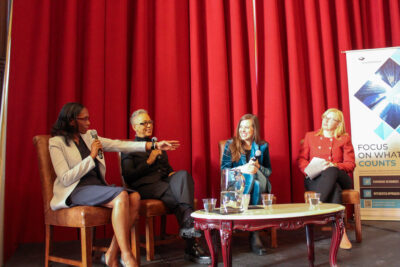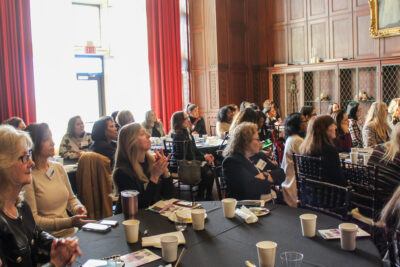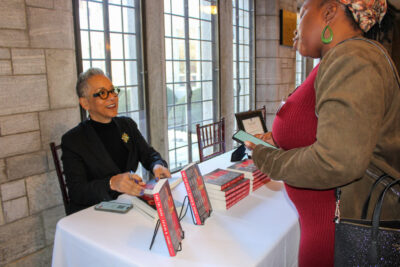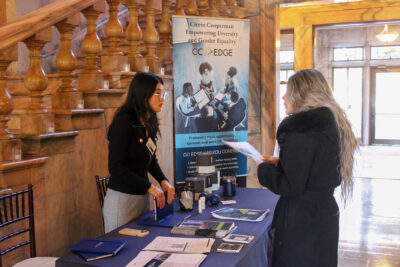Teamwork explored at ‘Women in Power’ event at Manhattanville University

“Women in Power”: It might seem a contradiction in terms. For millennia, women have lacked real power — political and financial. And so, they relied on other forms of influence, forging strong bonds and working relationships in the process.
While women have since achieved a great deal of success in many fields — nonetheless earning .84 cents for every $1 a man makes — they’ve retained those social networks that have helped them win hard-fought rights, personally and collectively.
So it’s no surprise that the role of teamwork in women’s workplace advancement was a prominent theme of “Women in Power,” a breakfast conference presented by Citrin Cooperman, a professional services firm with an office in White Plains, and the Westfair Business Journal.

“Teamwork makes the dream work,” panelist Katrina M. Adams told Catherine Sabol, a partner at Citrin Cooperman, and some 200 attendees. (The panel, sponsored by M&T Bank and introduced by Citrin Cooperman partner Chelsea Blancato, included Tara Rosenblum, a longtime, multiple Emmy Award-winning anchor/host/reporter for the News 12 Network, and Michelle A. Nicholas, founder and CEO of The NICO Consulting and a gracious last-minute substitute for Tyré Robinson, Tarrytown, New York, regional president of M&T Bank, who was unable to participate.)
Adams – a 20-time doubles champion on the Women’s Tennis Association (WTA) tour who served as president and chair of the White Plains-based United States Tennis Association (USTA) from 2015 to ’18 and is now executive director of the Harlem Junior Tennis & Education Program Inc. — said the public tends to think of tennis as an individualistic sport. Yet players are always thanking their teams of coaches, trainers and physical therapists for their success.
For Nicholas, teamwork began at home. “My first team were my parents,” said the Guyana native, recalling that after beginning her first job, she returned to her new, decidedly empty, apartment to find her mother there with all the furnishings she needed. When Nicholas founded the Mount Vernon- and Guyana-based NICO, she remembered the foundation her parents provided, a foundation that taught her to go inside herself to reach out to others.
But having the confidence to do just that is easier said than done. Nicholas — whose career has embraced nonprofits and for-profits, the public and the private sectors — drew knowing laughter when she said the introverted side of her personality would rather be home with a book and a cup of tea, binging on “Law & Order.” For her, “confidence is competence,” and she is using that competence, along with her values and an understanding of her own unique story, to help others grow in skills and confidence as well.

Not everyone on the panel seemed to struggle with confidence. “Is anyone else here a Leo?” Adams (Aug. 5 birthday) asked playfully of what is perhaps the zodiac’s most self-confident sign, waving a hand as others in the paneled room at Manhattanville’s Reid Castle shot up. Despite tennis being a sport in which participants lose more than they win – or maybe because of it – players are always confident they can win, she noted. Small wonder, then, that Adams, who has also been a coach and a commentator, titled her 2021 book — part tennis memoir, part business handbook — “Own the Arena: Getting Ahead, Making a Difference and Succeeding as the Only One” (HarperCollinsPublishers/Amistad).
“You have to own your courage,” she said, echoing one of the 12 “own” points in her book. And that can mean discussing one of the most controversial issues in business and government today. Sabol asked the panel about DEI (Diversity, Equity and Inclusion) – the umbrella term for initiatives designed to give qualified women and minorities a leg up on the heretofore uneven playing field of the workplace. DEI is opposed by the Trump Administration, which said it is eliminating such programs from the federal government to support meritocracy.

Adams and Nicholas — who said they know what it’s like to be the only one in a job who looks like them — spoke in favor of the initiative, which some companies had already challenged or eliminated in anticipation of the new administration’s government directive. (But not Citrin Cooperman, whose CC Edge “is a program committed to enhancing a culture…that understands, appreciates and supports the diverse, gender-specific needs of everyone in the firm. We are taking action to continue to move the needle forward in creating an inclusive workplace.”)
“DEI is not about running to the left or the right,” said Nicholas, who served as senior vice president, chief diversity officer and director of community development at PCSB Bank. “It’s about, Do you want to be listened to?” Ultimately, she added, it’s about “allowing people to feel they belong.”
And when employees realize that, she said, the results are satisfied consumers and increased revenues.
Adams, the first person of color to head the USTA, echoed those sentiments:
“You have to have diversity of thought. If you don’t, you’re not speaking for everyone.”
She quoted her mentor Billie Jean King, who said, “If you’ve never been excluded, then you don’t know what being included means.”